By Lucy Komisar
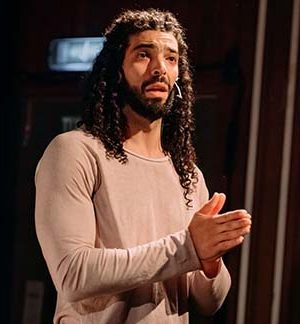
Ramy Essam became an iconic figure of the 2011 Egyptian mass protest that toppled dictator Mubarak but lost to military power. This autobiographical show is his powerful and moving story. And it’s very good theater.
Ramy sits on a chair strumming his guitar or at a desk streaming video on a screen. He wears high sneakers and a casual long-sleeved shirt. His beard and hair are long, black and curly. He is calm, almost nonchalant, as he describes how his life turned around when he took his guitar to the protest in Tahrir Square, saw the violence, was jailed and tortured.
He was a street guy, a body builder, caught up in violent masculine culture, until his sister got him to change direction. At a small cultural center, he heard songs about freedom and equality and social justice.
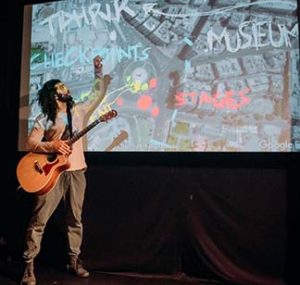
And then, at 22, he took part in Egypt‘s Arab Spring. He tells the story effectively in narrative, video and song.
He shows black and white videos of police beating and torturing men and women. Teeth were knocked out, faces bloodied. He says, “They filmed themselves and applauded themselves.” He says he lost five friends.
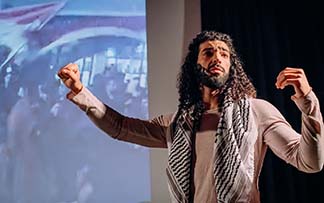
He founded a group on Facebook that called for a protest demonstration January 28, 2011, “the Friday of anger.” Demands were for “bread, freedom, social justice” — an end to police corruption and for a minimum wage. They shouted “down, down Mubarak,” the dictator for 30 years.
Days later, he says, “I found myself standing on the roof of a car” on the street of the party of the dictator…And then I said: Let‘s attack it.” The group set fire to the empty building.
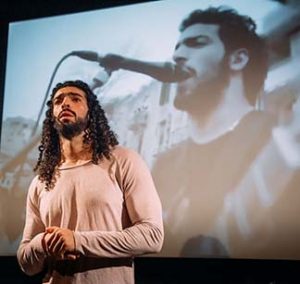
He shows a video of him performing at Tahrir Square, where he sang to thousands. He has aged a lot. He was much younger in face and demeanor six years ago, but even then brash with songs of satire: “Bow your head, bow it, you are in a democratic home.”
On February 1, 2011, Mubarak stepped down. There were celebrations. Ramy says, “People didn‘t understand the problem was not Mubarak but the military system. We had the power but lost it.”
When the crowds chanted, “Down, down the military system,” they were arrested. Ramy was among 200 taken March 9th when police attacked a sit-in. With some irony, defiling Egypt‘s great culture, they took people to the courtyard of the Egyptian Museum. Ramy tells how he was beaten, tortured.
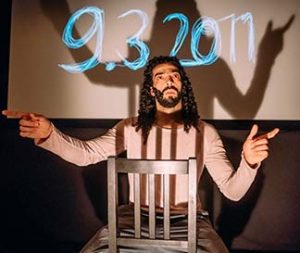
He recalls, “They also cut my hair. With a piece of broken glass. They just got more and more stupid. They even electrocuted me. My face was bleeding, and it was very swollen. I was almost naked. My body was covered with wounds and blood.”
He says, “One can say that the revolution failed 100 %. We didn‘t achieve our goals. Not yet. Many things are even worse now.”
His hope is with the youth. He says, “We planted a seed in the next generation: They are different than us. They are not chained in their minds, they are not brainwashed, they don‘t believe in the state media, they are free. I‘m sure that the new generation will make the change together with us.”
He says, “I get hundreds of letters from young people talking about a better future for everyone. I‘m sure they will one day take the next step of the revolution.”
He left Egypt 2 ½ years ago and went into exile in Sweden and Finland, but he plans to return “to try to finish what we started.” He says, “The only thing dictators can‘t stop is art. They can‘t kill my music.”
“Ramy: in the Frontline.” Written and performed by Ramy Essam, directed by Maria Lundström. Viirus Theatre at Edinburgh Theatre Festival Fringe, Aug 2017. See Ramy and some of his video here. 8/13/17.

